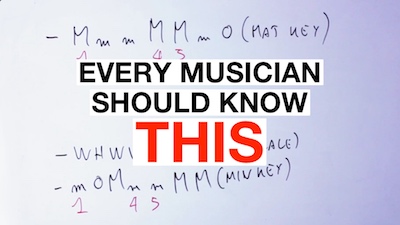The One Thing That Every Musician Must Know In Music Theory


First of all, a big THANK YOU to all the people who are submitting questions and ideas for new videos! I couldn't do all this without you!
Now, onto today's music theory, just like the doctor ordered:
- "If you could teach a person only one thing about music theory, what would you teach them?"
- "What is the piece of music theory that everybody, professional and amateurs, should know?"
- "What is the most useful, 'practical' concept in music theory? Something that I will actually use?"
These are all questions that I received from my subscribers. And they are really good questions!
The thing I like best about these questions is that they ask about the 'practical' bits of music theory. I personally think that we could have picked a better name than 'music theory'- maybe something like "music tools". But I digress.
All the three questions above have the same answer, and we are going to see it together.
(BTW before I forget: you can ask your questions too, by replying to this email or in the YT comments to the video. I made many videos in answer to questions you ask, and I read all requests!)
In this video we see one of the most 'practical' thing that you can learn in music theory, and it's something that everybody who calls themselves a musician should know.
Fair warning: clearly, if you already have experience in music theory, this video may not be news to you. But I'm going to put a shameless plug here and tell you that you still want to make sure you know this :)
If you liked this video, your next step is to get a refresher on the super basics of music theory from a different perspective than what you may have been taught.
The video below is a concise and effective primer on all things music theory:
And where do your go from there? If you still have an appetite for interesting sounds, have a look at this other video on 7th chords.
Most musicians use just triads (3-notes chords) in their music, so if you want to get a different sound, you may start to use 7th chords (4-notes chords) and add a different 'zest' to your music:
And finally (wow, this was a long article with all these videos...) if you want to know more and get a definitive edge in your music - whether you are writing music or playing covers of other musicians - you want to check out the ultimate course in chords and harmony on guitar.
This course will make you take it any old and simple chord progression and make it sound wonderful on your guitar. The course does not teach you a style: it gives you the tools to find your OWN style.
Where can you find this course? Why, here: Complete Chord Mastery Guitar Course
Did you find this video helpful? Do not miss the next Music Theory videos!
Subscribe to the MusicTheoryForGuitar YouTube channel by clicking the button below.